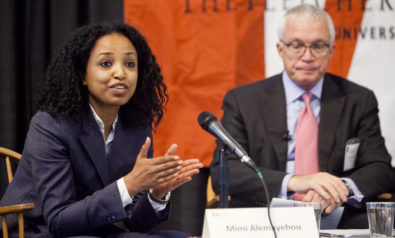With Africa being brought into the focus of global attention, Tufts University’s Fletcher School discusses insightful ideas on the future of the continent.
Five years since the commencement of the worst financial crisis in recent memory, the news out of the global economy is far from cheerful. The United States is coping with slow growth and an anemic job market. The state of the industrialized world outside the United States is even worse, with the Eurozone in an existential crisis and Japan going on two “lost decades.” The emerging market darlings, China, India and Brazil, despite their rapid re-bounds after the 2008-2009 crisis, are decelerating.
Where should the global economy go next in its search for fresh opportunity? Many widely cited analysts are independently singing the praises of a single region: Africa.
McKinsey alludes to “lions on the move”, while the Boston Consulting Group has highlighted the potential for African challengers that will emerge from the “overlooked continent.” The Economist magazine finds that six of the world’s ten fastest-growing economies in the last decade were in sub-Saharan Africa, while the IMF predicts that Africa will be home to seven of the top ten fastest growing economies in the next five years. Conferences to discuss Africa’s untapped potential have mushroomed. Policy makers and scholars are talking about an international race for Africa. There is no doubt that many parts of sub-Saharan Africa are posting impressive statistics, often eclipsing the emerging market darlings, even as the darlings themselves are engaging with Africa in interesting ways.
At the same time, the wider context that characterizes the continent remains complicated; and there is a long history of bad choices made in and about Africa because the context—the politics, the history, the state of the human condition—was exploited, misunderstood or just ignored. In keeping with the other analysts, Goldman Sachs headlined its recent report, “Africa’s Turn.” At the Institute for Business in the Global Context, housed in Tufts University’s Fletcher School, we decided to start with that simple declaration and put a question mark at the end of it: Africa’s Turn? We are organizing a signature international conference that leads with that essential question, in search for further insight.
“Africa’s Turn?” conference participants will gain a unique perspective on placing bets on Africa—for profit or for development and social progress or both—with a nuanced understanding of the local, regional and international context. The participants and speakers are at the “Final Frontier’s” frontier, shaping business and investment, policy, development and international relations in Africa. At the very least, the participants will have a fresh set of questions to ask about one of the world’s most critical regions and a framework to search for the answers.
At The Fletcher School, we have many experts who have approached Africa from every possible angle: from key decision making roles in government and the private sector to negotiations between states and post-conflict reconstruction, from understanding food, water and fuel security issues to studying the impact of wireless technologies on economic development. However, we firmly believe that the key to the future of the continent is with the next generation of leaders, who are about to launch their professional or post-undergraduate careers. We asked them to imagine the Africa that might materialize ten years from today so that we could tap into their creativity as a complement to our natural expertise drawing on our experience and research on the past. We established an open essay contest on imagining Africa 2022 and received a treasury of intriguing and provocative ideas. They were, on the whole, both hopeful and bold. We wanted to share them with a wider audience. What follows are two outstanding examples.
For more than 10 years, Fair Observer has been free, fair and independent. No billionaire owns us, no advertisers control us. We are a reader-supported nonprofit. Unlike many other publications, we keep our content free for readers regardless of where they live or whether they can afford to pay. We have no paywalls and no ads.
In the post-truth era of fake news, echo chambers and filter bubbles, we publish a plurality of perspectives from around the world. Anyone can publish with us, but everyone goes through a rigorous editorial process. So, you get fact-checked, well-reasoned content instead of noise.
We publish 2,500+ voices from 90+ countries. We also conduct education and training programs on subjects ranging from digital media and journalism to writing and critical thinking. This doesn’t come cheap. Servers, editors, trainers and web developers cost money.
Please consider supporting us on a regular basis as a recurring donor or a sustaining member.
Support Fair Observer
We rely on your support for our independence, diversity and quality.
Will you support FO’s journalism?
We rely on your support for our independence, diversity and quality.






